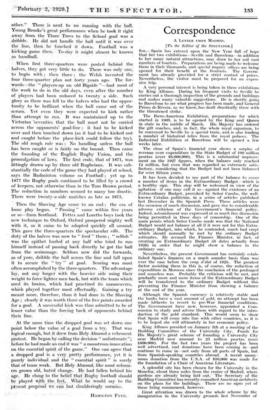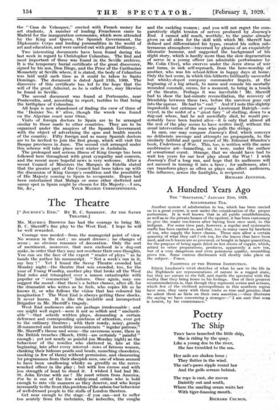Correspondence
A. LETTER FROM MADRID.
T
[o the Editor of the SPECTATOR.]
• •
Sia,—Spain has entered upon the New Year full of hope that her two exhibitions—Seville and Barcelona—in addition
to her many natural attractions, may draw to her soil vast numbers of tourists. Preparations are being made to welcome them in their thousands, and special inquiry offices are being opened for their benefit at the frontiers. The Govern- ment has already provided for a strict control of prices. Nevertheless, the visitor must be prepared for an expen- sive trip.
A very personal interest is being taken in these exhibitions by King Alfonso. During his frequent visits to Seville he carries out a thorough inspection of the grounds and buildings and makes many valuable suggestions. He is shortly going to Barcelona to see what progress has been made, and General Primo de Rivera, as we know, has dealt drastically there with the threatened strike.
The Ibero-Ameriean Exhibition, preparations for which started in 1909, is to be opened by the King and Queen
in state in the middle of March. His •majesty has ordered
the gilt coaches, and, in fact, the whole royal caparison, to be conveyed to Seville by a special train, and. is also lending.
a number of historical relics from the royal palaces. The Industrial Exhibition at Barcelona will be opened a few weeks later.
The close of Spain's financial year shows a surplus of revenue over expenditure in the State Budget of 190 million pesetas (over £6,000,000). This is a substantial improve- ment on the 1927 figures, when the balance only reached 12 million, but even that was regarded as extremely satis- factory, considering that the Budget had not been balanced for over fifteen years.
It has been 'decided to use part of the balance, to cover a number of items in the Extraordinary Budget—which is a healthy sign. This step -will -be welcomed in view of the
agitation—if one may call it so—against the existence of an Extraordinary Budget, provoked by Senor Cambo, the well- known Catalan .politician, in a series of articles published last December in the Spanish Press. These articles were the occasion of much discussion, and gave rise to considerable adverse criticism of the Government's financial policy. Indeed, astonishment was expressed at so much free discussion being permitted in these days of censorship. One of the main points which Sefior Cambo made was that the National Budget would not balance at all if it were not for this Extra- ordinary Budget, into which, he contended, much had crept which should normally be met by the ordinary Budget estimates. He accused the Finance Minister, in fact, of creating an Extraordinary Budget (it dates actually from 1926) in order that he might show a balance in the ordinary one.
Nevertheless, the present Government has certainly estab- lished Spain's finances on a much sounder basis than was ever the case before the coup d'etat of 1928. The greatest
factor assisting them in this is, of course, the reduction of expenditure in Morocco since the conclusion of the prolonged
and senseless war. Probably the criticism will be met, and gradually more and more items of the Extraordinary Budget will be transferred to the ordinary Budget without this preventing the Finance Minister from showing a balance at the end of the year.
Although the Spanish currency is relatively stable and the banks have a vast amount of gold, no attempt has been made hitherto to revert to pre-War financial conditions.
The Government have now, however, appointed a Com- mission to study and advise them with regard to the intro- duction of the gold standard. This would seem to show that Spain will, come into line with other countries, as it is to be hoped she will ultimately in her economic policy.
King Alfonso, presided- on January 5th at a meeting of the Building Committee of the University City. Funds for
His Majeity's great schenie of founding a University City
near Madrid now amount to 25 million pesetas (over £800,000). For the last two years the project has been well advertised, and donations have been coming in—and continue to come in—not only from all parts of Spain, but from Spanish4eaking countries abroad. A recent anony- mous donation from the U.S.A. of 810,000 was made for the foundation of a Chair of American Literature.
A splendid site has been chosen for the University in the Moneloa, about three mileS from the centre of Madrid, where gnrdens are alienclY being laid out:' The Secretary of the Building Committee has recently consulted American architects on the plans for the buildings. There are no signs yet of these being commenced, however.
Great attention was drawn to the whole scheme by the inauguration in the University grounds last November of the " Casa de Velasquez," erected with French money for art students. A. number of lending Frenchmen came to Madrid for the inauguration ceremonies, which were attended by the King and Queen, the Spanish Government, the Diplomatic Corps and leading personalities in the world of art and education, and were carried out with great brilliancy.
Two interesting documents have been found during the last week in regard to Christopher Columbus. The first and most important of these was found in the. Seville archives. It is the temporary burial certificate of the great discoverer, signed by his son, Don Diego, and the Prior of the Carthusian Monastery at Seville where, it is stated, the body of Columbus was laid until such time as it could be taken to Santo Domingo. The document is dated April 11th, 1509. The discovery of this certificate has led to the hope that the will of the great Admiral, as he is called here, may likewise be found in Seville.
The second document was found at Portosanto, near Pontevedra, and, according to report, testifies to that being the birthplace of Columbus.
All hope is now abandoned of finding the crew of three of the Domier No. 8' alive, though the wreck was found on the Algerian coast near Oran.
Visits of foreign doctors to Spain are to be arranged similar to those made to other countries. They are to be organized under the auspices of the Spanish Government with the object of advertising the spas and health resorts of the country. Fifty foreign and as many Spanish doctors are to be invited to join the first group, which will visit the Basque provinces in June. The second visit arranged under this scheme will take place next winter in Andalucia.
The prolonged and serious illness of King George has been followed here throughout with great sympathy and concern, and the recent more hopeful news is very welcome. After a recent Council of Ministers the Marques de Estella stated that the greater part of the Council had been taken up with the discussion of King George's condition and the possibility of His Majesty coming to Spain to recuperate. Hopes had been entertained that Malaga or some other sheltered and sunny spot in Spain might be chosen for His Majesty.—I am,









































 Previous page
Previous page